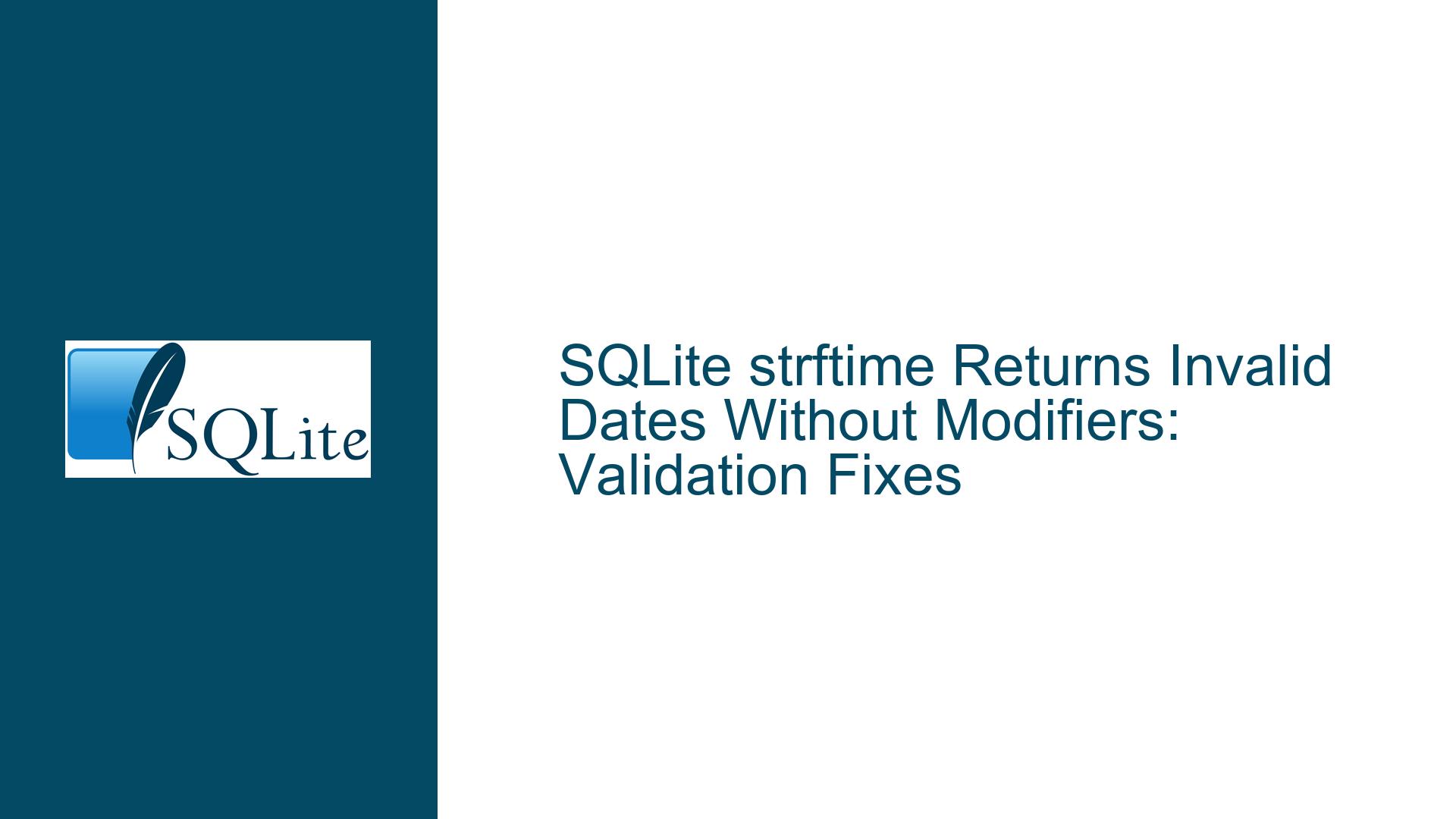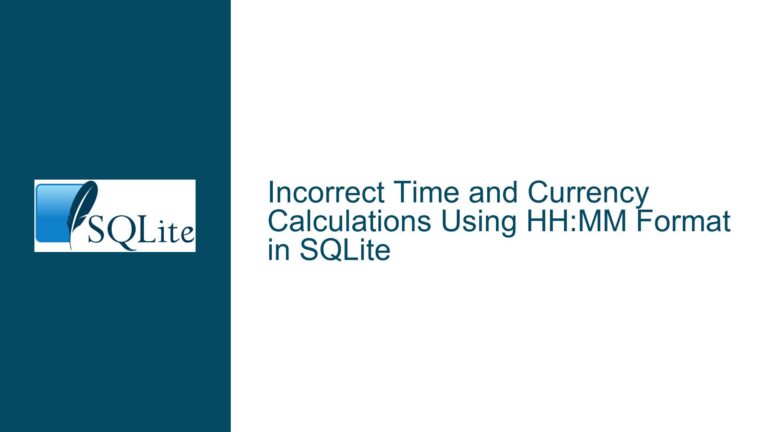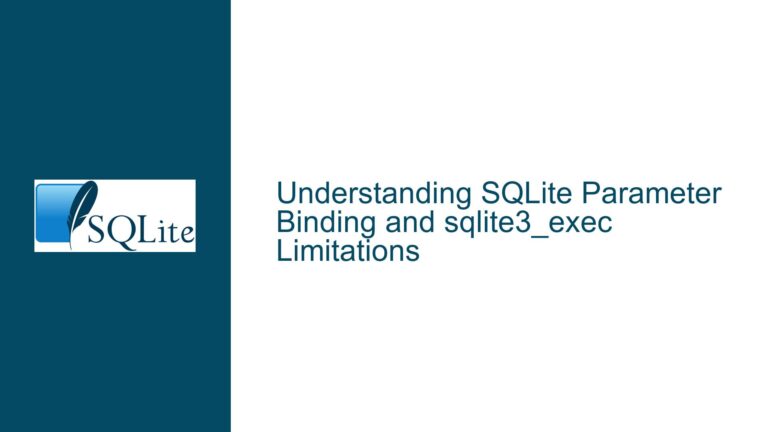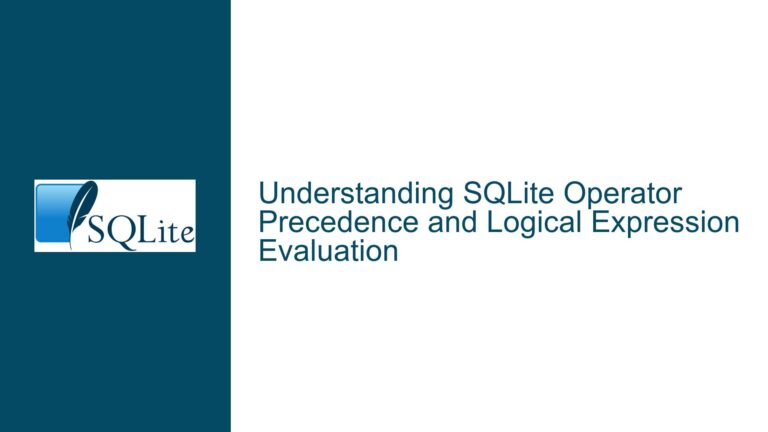SQLite strftime Returns Invalid Dates Without Modifiers: Validation Fixes
Understanding SQLite’s Date Handling and strftime’s Unexpected Outputs
The core issue revolves around SQLite’s strftime function returning seemingly valid date strings for inputs that represent invalid calendar dates (e.g., '2020-09-31'), while rejecting other invalid dates (e.g., '2020-09-32'). This discrepancy arises from SQLite’s internal date parsing mechanics and its tolerance for date overflow scenarios. When date modifiers (e.g., '+0 seconds') are applied, strftime recalculates the date, exposing hidden validation steps. This behavior has significant implications for data integrity in applications relying on SQLite for date validation. Below, we dissect the technical foundations of this issue, explore why SQLite exhibits this behavior, and provide actionable solutions for enforcing strict date validation.
SQLite’s Date Parsing Logic and Overflow Tolerance
How SQLite Processes Date Strings
SQLite’s date/time functions operate on Julian Day Numbers, converting input strings into an internal numerical representation. The parsing process follows these stages:
- String Tokenization: The input string is split into year, month, day, hour, minute, second, and timezone components.
- Component Validation: Basic checks ensure numerical ranges (e.g., year 0000-9999, month 01-12, day 01-31).
- Julian Day Calculation: Valid components are converted to a Julian Day Number.
Crucially, overflow handling occurs during Julian Day conversion. For example, '2020-09-31' is parsed as September 31, but since September has only 30 days, the overflow (1 day) rolls into October 1. However, this recalculation only happens if a date modifier is applied or if the date is used in arithmetic operations. Without modifiers, SQLite does not validate the existence of the day in the specified month.
Why strftime Behaves Differently With Modifiers
The strftime function exhibits two distinct modes:
- Pass-Through Mode: When no modifiers are present,
strftimeperforms minimal validation and returns the input string components as-is if they satisfy basic format requirements (e.g.,YYYY-MM-DD). - Recalculation Mode: Modifiers force SQLite to parse the input into a Julian Day Number, apply the modifier(s), and format the result. This process inherently validates the date.
This duality explains why strftime('%Y-%m-%d', '2020-09-31') returns 2020-09-31 (pass-through), while strftime('%Y-%m-%d', '2020-09-31', '+0 seconds') returns 2020-10-01 (recalculation). Dates like '2020-09-32' fail even in pass-through mode because the day exceeds the maximum allowed value (31), violating basic component validation.
Component Validation vs. Calendar Validation
SQLite distinguishes between:
- Component Validity: Ensures individual parts (year, month, day) fall within allowed ranges.
- Calendar Validity: Ensures the combination of components represents a real calendar date.
Component validity is enforced during initial parsing. Calendar validity is not checked unless the date is converted to a Julian Day Number. This design choice prioritizes flexibility and performance but shifts the burden of calendar validation to developers.
Risks of Silent Date Overflows and Data Corruption
Undetected Invalid Dates in Queries
Queries using unvalidated dates may produce incorrect results. For example:
SELECT COUNT(*) FROM events
WHERE date BETWEEN '2023-02-28' AND '2023-02-29';
If '2023-02-29' is stored without validation, the query will include non-existent dates, leading to inaccurate analytics.
Inconsistent Behavior Across Operations
Date arithmetic and comparisons behave unpredictably with invalid dates:
SELECT '2020-09-31' < '2020-10-01'; -- Returns 1 (true)
SELECT DATE('2020-09-31') < '2020-10-01'; -- Returns 0 (false)
The first comparison treats the strings lexicographically, while the second converts them to Julian Days.
Impact on Indexes and Constraints
Unique indexes or primary keys using date columns may allow duplicate entries if invalid dates are stored as strings. For example:
CREATE TABLE logs (event_date TEXT PRIMARY KEY);
INSERT INTO logs VALUES ('2020-09-31'); -- Succeeds
INSERT INTO logs VALUES ('2020-10-01'); -- Fails (primary key conflict)
Here, '2020-09-31' and '2020-10-01' are distinct strings but represent the same Julian Day after recalculation.
Timezone Complications
Timezones exacerbate the problem. A valid UTC date might become invalid in another timezone, but SQLite does not automatically adjust for this unless explicitly instructed.
Enforcing Strict Date Validation in Schema Design and Queries
Solution 1: Check Constraints with Forced Recalculation
Use a check constraint to compare the stored date with its recalculated form:
CREATE TABLE events (
event_date TEXT CHECK (
event_date IS strftime('%Y-%m-%d', event_date, '+0 seconds')
)
);
How It Works:
strftime('%Y-%m-%d', event_date, '+0 seconds')converts the input to a Julian Day, applies a zero-second offset (no-op), and formats it back.- If the original date is invalid (e.g.,
'2020-09-31'), the conversion yields'2020-10-01', failing the check.
Limitations:
- Requires the
event_dateto be inYYYY-MM-DDformat. - Does not handle time components or timezones.
Solution 2: Date Normalization on Insert/Update
Use triggers to automatically replace invalid dates with their normalized equivalents:
CREATE TRIGGER validate_date BEFORE INSERT ON events
BEGIN
SELECT CASE
WHEN strftime('%Y-%m-%d', NEW.event_date, '+0 seconds') != NEW.event_date
THEN RAISE(ABORT, 'Invalid date')
END;
END;
Advantages:
- Centralizes validation logic.
- Works with any date format supported by SQLite.
Solution 3: Application-Side Validation
Validate dates before insertion using application code. For example, in Python:
from datetime import datetime
def validate_date(date_str):
try:
datetime.strptime(date_str, '%Y-%m-%d')
return True
except ValueError:
return False
When to Use:
- When working with multiple date formats.
- To avoid SQLite’s parsing overhead.
Solution 4: Storing Julian Day Numbers
Store dates as Julian Day Numbers instead of strings:
CREATE TABLE events (
event_date REAL CHECK (
event_date IS julianday(strftime('%Y-%m-%d', event_date))
)
);
Benefits:
- Eliminates string formatting ambiguities.
- Simplifies date arithmetic.
Solution 5: Using the date Function for Implicit Validation
The date() function implicitly converts inputs to Julian Days:
SELECT date('2020-09-31'); -- Returns NULL
Use this in queries to filter invalid dates:
SELECT * FROM events WHERE date(event_date) IS NOT NULL;
Handling Timezones and Non-UTC Dates
To validate dates in specific timezones, use datetime with UTC conversion:
CHECK (
event_date IS strftime('%Y-%m-%d', event_date || ' UTC', 'utc', '+0 seconds')
)
This ensures dates are interpreted in UTC before validation.
Conclusion: Balancing Flexibility and Integrity in SQLite Date Handling
SQLite’s lenient date parsing offers flexibility for edge cases (e.g., scheduling systems that allow "March 32nd" as an alias for April 1st) but poses risks for applications requiring strict calendar validity. Developers must proactively implement validation using check constraints, triggers, or application logic. By understanding the interplay between pass-through and recalculation modes in strftime, teams can design schemas that prevent silent data corruption while leveraging SQLite’s lightweight date/time functions efficiently.






